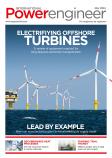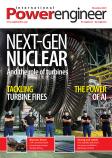The reliability and efficiency of combined heat and power (CHP) plants can easily be increased by rapid determination of the methane number. Florian Krischker shows some findings from a coastal power plant in Germany
According to the latest available data from Eurostat in 2019, heat production accounts for about half of total energy consumption in the European Union (EU). This includes the use of energy for space heating, water heating and industrial processes that require heat. Reducing the carbon intensity of heat production is an important priority to achieve the EU’s climate and energy targets.
In January 2020, Stadtwerke Kiel commissioned a gas-fired coastal power plant, replacing a 40-year-old coal-fired power plant. This has reduced CO2 emissions by 70% and increased fuel utilisation to 90%. The modular design gives the power plant a high degree of flexibility. The output of the individual engines is adapted to the current energy demand. 20 gas engines in four blocks can be ramped up to a nominal electrical output of 190MW in less than five minutes. During operation, a thermal output of 192MW can be generated simultaneously. By comparison, the old power plant needed at least four hours to ramp up.
The composition of natural gas in the European grids has changed in recent years due to several factors. The production and use of unconventional gas, such as shale gas, has increased. This gas often has a different composition than conventional gas and can vary depending on the source. In addition, supply countries have changed for economic and political reasons. Renewable gases such as biomethane and hydrogen are also increasingly used. All these points complicate the design of plants and shorten the time to adapt to the new circumstances. Daily or hourly values determined by the gas network operator with gas chromatographs are suddenly too inaccurate.
For gas engines, the gas quality is not indicated with the calorific value or the Wobbe index, but with the methane number. The methane number indicates how knock-resistant a fuel is in a gas engine. Knocking occurs when the fuel-air mixture in the engine cylinder ignites spontaneously and can damage the engine. A higher methane number indicates a fuel that is resistant to knock.
Delivering real-time measurement data
For the coastal power plant, a gasQS flonic from Mems was installed directly at the gas transfer station. Every 30 seconds, it determines the methane number and the heating value, which it transmits to the control centre. The Jenbacher gas engines are controlled on basis of this data. The measurement data have shown that the fluctuations in the natural gas network are not just theory. Between commissioning and today, the methane number has dropped from 91 to 80.
The methane number does not directly affect the efficiency of a gas engine, but it can indirectly affect the ability of the control system to optimise fuel combustion, which in turn affects efficiency. A project at the Eidgenössische Materialprüfungs- und Forschungsanstalt (EMPA) in 2016 showed that up to 1.3% efficiency can be gained by adjusting the ignition curve (see Measurement 91 (2016) 661-679).
A rough estimate shows that with an efficiency increase of only 0.1%, the operator already saves €2,000 per day. So not only has it increased the reliability of its power plant, but it has already recouped the investment after just one week. The gasQS flonic installed four years ago runs maintenance-free, stable, with high accuracy and to the great satisfaction of the power plant operator, Stadtwerke Kiel.
Florian Krischker is product manager gasQS at Mems


















